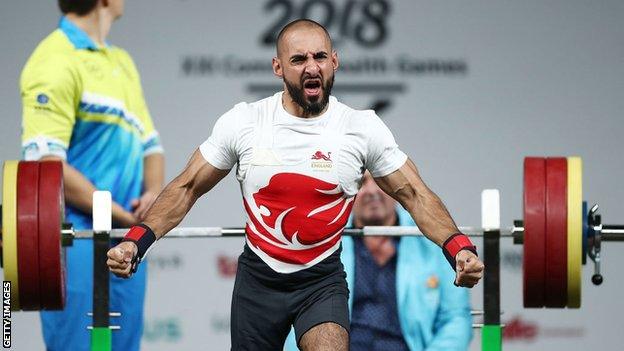Tokyo 2020 Paralympics: Ali Jawad rejects Crohn's disease treatment in bid to compete
- Published

Double amputee Ali Jawad, 30, was diagnosed with Crohn's disease in 2008
British Paralympian Ali Jawad has rejected treatment for Crohn's disease - refusing a stem cell trial involving chemotherapy and perhaps a stomach bag - in a bid to qualify for Tokyo 2020.
The double amputee powerlifter says his current medication is not working.
He said: "I had two choices: a stem cell trial which involved aggressive chemotherapy or a stomach bag.
"Both options looked like I might have to retire, so I decided to reject both and try to fight it all the way."
After winning a silver medal in the -59kg category at the Rio 2016 Paralympics, Jawad was restricted from competing as his condition, an inflammatory bowel disease,, external flared up.
He spent the following year "bed ridden and in and out of hospital", before recovering and winning Commonwealth -54kg bronze on the Gold Coast in 2018 and gold at the World Para-powerlifting European Championships the same year.
This year Jawad, known for animated celebrations that have gone viral on social media,, external says he needs to be in the top eight in his weight category to qualify for Tokyo 2020.
Speaking to BBC Radio 5 live's Friday Sports Panel, the 30-year-old said: "Right now, I'm in that top eight after last year's performances but I don't know what shape I'll be in by the time I get there because every week we're dealing with a disease which is so unpredictable.
"There is still fight in me but we'll see how the next 10-12 weeks go.
"I want to retire on my terms and not on Crohn's terms - for me it is the burning desire to retire with happiness and not regret."
He said he had always wanted to be one of the first people with Crohn's disease to win a medal at an Olympics or Paralympics, and that he and swimmer Kathleen Baker had both achieved it at Rio 2016.
Of his decision to refuse treatment before Tokyo qualifying, he said: "Sometimes it's mind over matter - when you're so used to that amount of pain on a daily basis it becomes the norm and, with some of the days that are less painful, you don't take them for granted.
"I knew it was going to be like this and with the option I took, I knew it would be one hell of a fight and I don't regret it."